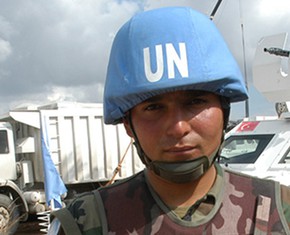The views expressed in our content reflect individual perspectives and do not represent the authoritative views of the Baha'i Faith.
We live in a time of global crisis, recognized by many expert observers of human affairs.
Humanity has about a decade, according to a recent IPCC report, to radically change its way of life in order to avert the gradual environmental catastrophe brought on by climate change.
War, terrorism, poverty, social injustices inflicted on marginalized groups, obscene inequalities within and between nations also continue to plague our world, spurred on by competition for advantage and privilege, beliefs in the superiority of some groups over others, self-centered motives, and various forms of prejudice. Likewise, social polarization, the weakening of family bonds, addictions of various sorts, apathy and loneliness threaten social cohesion, and leaders and governments seem increasingly incapable of agreeing on and carrying out long-term solutions to the pressing problems we face.
Some insightful thinkers look deeper and recognize these mounting problems affecting every nation as not only interconnected and mutually reinforcing, but, as physicist Fritjof Capra put it in his book Steering Business Towards Sustainability, as “different facets of one single crisis,” namely “a crisis of perception” driven by the fact that “most of us … subscribe to the concepts of an outdated world view.”
The teachings of the Baha’i Faith attest to this crisis of perception, and go even further to characterize it as a global spiritual one: “The universal crisis affecting mankind is, therefore, essentially spiritual in its causes.” – The Universal House of Justice, Messages 1963 to 1986, p. 629.
One reason it helps to view this crisis as fundamentally spiritual becomes apparent when we consider that whether a person clings to an outdated, conventional worldview, or chooses to question the status quo and exert the effort and make the sacrifices required to realize a better way, depends on the condition of that person’s soul, far more than on any intellectual training and skill.
The Baha’i writings further explain how these kinds of global crises have previously led to the decline and collapse of human civilizations. At the same time, the Baha’i teachings point out that such epochal, civilizational breakdowns are invariably accompanied by the appearance of new divine revelations, which offer renewed visions of truth, beauty and goodness and inspire new ways of life. Much more can be said about that dual process of integration and disintegration that results when an old social order disintegrates as the seeds of a new civilization germinate – but let’s consider one important aspect of this crisis, namely the crisis of truthfulness in today’s world.
Most of us understand truthfulness as a person’s commitment to seek, speak, and live in accordance with truth. This moral commitment closely connects to the qualities of sincerity, integrity, faithfulness, trustworthiness, etc. A crisis of truthfulness, then, occurs when we witness an increasing abandonment of this commitment throughout society.
At present, we can discern a crisis of truthfulness in both its effects on the psychology of individuals and on the corruption and malfunctioning of social institutions. One particularly conspicuous example of the latter – the information warfare occurring in today’s political and media systems – has created “echo chambers” that exacerbate social divisions and mitigate against mutual understanding and dialogue. They have formed as a result of the explosion of media sources in a competitive marketplace primarily driven to pursue financial profit rather than truth. They foment the deliberate distortion of facts by interest groups for commercial and political purposes, and intentionally mislead media consumers toward uncritical acceptance of mindless entertainment and sources of “news” that only serve to confirm their biases.
As for the psychological consequences of a lack of truthfulness, most approaches to psychotherapy attest to the psychic distress and suffering caused by lying to oneself, and the profound self-honesty and taking of responsibility that psychological healing requires.
This crisis of truthfulness has created a larger crisis for human civilization. Baha’u’llah, the prophet and founder of the Baha’i Faith, wrote:
In these days truthfulness and sincerity are sorely afflicted in the clutches of falsehood, and justice is tormented by the scourge of injustice. The smoke of corruption hath enveloped the whole world in such wise that naught can be seen in any direction save regiments of soldiers and nothing is heard from any land but the clashing of swords. – Baha’u’llah, Tablets of Baha’u’llah, p. 38.
The ability of any society to deal with the critical issues it faces depends on the prevalence and practice of truthfulness at all levels. If leaders and authorities cannot be trusted to speak truthfully, if media does not strive to present unbiased assessments of the critical issues society faces, if the importance of keeping one’s word is no longer widely upheld, if the essential relationships that constitute a society are not largely based on truthful communication, then the fabric of society disintegrates. Over a century ago, Baha’u’llah recognized this crisis of truthfulness as a defining feature of our times. Commenting on Christ’s prophetic statement about “the oppression of those days” in Matthew 24:29, Baha’u’llah observed that we seem to now occupy those days Christ foretold:
Such a condition as this is witnessed in this day … What ‘oppression’ is more grievous than that a soul seeking the truth, and wishing to attain unto the knowledge of God, should know not where to go for it and from whom to seek it? – Baha’u’llah, The Book of Certitude, pp. 29-31.
















Comments
Sign in or create an account
Continue with Googleor